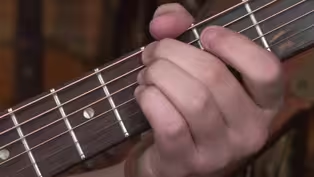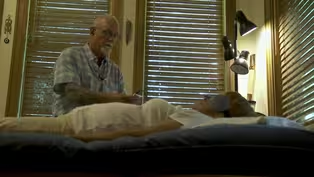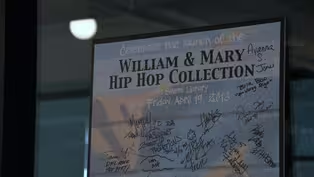VPM News Focal Point
Keeping Folk Traditions Alive
Clip: Season 2 Episode 16 | 8m 39sVideo has Closed Captions
The Virginia Humanities Folklife Apprenticeship helps musicians connect to their roots.
The Folklife Apprenticeship Program run by Virginia Humanities connects mentor artists with those still perfecting their craft. The goal is to preserve folk traditions and practices through sharing stories and skills.
Problems playing video? | Closed Captioning Feedback
Problems playing video? | Closed Captioning Feedback
VPM News Focal Point is a local public television program presented by VPM
VPM News Focal Point
Keeping Folk Traditions Alive
Clip: Season 2 Episode 16 | 8m 39sVideo has Closed Captions
The Folklife Apprenticeship Program run by Virginia Humanities connects mentor artists with those still perfecting their craft. The goal is to preserve folk traditions and practices through sharing stories and skills.
Problems playing video? | Closed Captioning Feedback
How to Watch VPM News Focal Point
VPM News Focal Point is available to stream on pbs.org and the free PBS App, available on iPhone, Apple TV, Android TV, Android smartphones, Amazon Fire TV, Amazon Fire Tablet, Roku, Samsung Smart TV, and Vizio.
Providing Support for PBS.org
Learn Moreabout PBS online sponsorship♪ ♪ DENA JENNINGS: It's breath, you know, it's the air I breathe.
♪ When we study the music itself, what banjo tunes are, you hear that not only in Black American music, but you hear it in music throughout the Caribbean and from West Africa.
You hear those same melodies, those same rhythms, those same tones.
♪ COREY HARRIS: When Blues was at its inception, it was a form of news, of information, of a way of telling people what's going on around the block, and we have lost a lot of that.
♪ LAMONT PEARLEY: My goal always is to put the Blues people's story in a proper context and to inspire and advocate for individuals or collectives of any particular folk group to tell and present their story and tradition.
♪ KATY CLUNE: The Virginia Folk Life Apprenticeship Program receives support from the National Endowment for the Arts and we have the honor and joy of giving funding to pairs of people.
Usually two, sometimes the teams are bigger who are deeply committed to sustaining a cultural tradition.
♪ We're really excited this year to support Dena Jennings, Corey Harris and Lamont Pearley.
This is a kind of a powerhouse of a team.
We were surprised to see Corey Harris show up in the applications as both a mentor and an apprentice.
He was seeking to work with Lamont Pearley in the Piedmont Blues tradition, but also seeking to work with Dena Jennings and learning how to build a gourd banjo.
DENA JENNINGS: I'll take out a gourd out of one of these bags and I remember growing that gourd.
I remember where it was on the vine.
It's like, ‘Okay, come on, we're going to make an instrument.
I bring a traditional Black Appalachian style that the Blues is a cousin to or a part of, but it has its own little flavor.
It's straight from the mountains of Appalachia.
♪ That's the beauty of this circle is that I hope to learn from Lamont a better understanding of the Blues people because I know that's related to Black Appalachia, but I'm not always sure how.
♪ COREY HARRIS: People die, generations die, but it's the stories that endure and it's those stories that we use so that we can cooperate and so that we can make culture and do things.
DENA JENNINGS: Hold it as straight up and down as you can.
COREY HARRIS: Thinking about the Story Gourd Workshop, it just makes me contemplate the power of the stories that we have that are holding us up.
LAMONT PEARLEY: It felt like it went quicker and a little easier down...
So the three of us collectively are looking to kind of not only bring it together, but give it its proper context in spaces that it's appreciated and then in spaces that dont necessarily understand that the nostalgia of our tradition, culture, and heritage as it is practiced is somewhat disrespectful or insensitive is a better word.
COREY HARRIS: It tends to not look at it as something that is like living and real in the present time.
It's made into a commodity that can be like opened, and unboxed at will and then sold and then closed again and put up on the shelf instead of something that's like you have to use every day.
LAMONT PEARLEY: So we just kind of want to put these things in the proper context and just play, right?
♪ DENA JENNINGS: You know, as soon as emancipation came, Blacks were looking for their families.
So we've been searching for one another for a long time through our stories, through our music, through our collaborations with one another.
LAMONT PEARLEY: My family's movements, our family's movements made what we know to be the Great Migration.
We are descendants of the Great Migration and the music traveled with our family, which is why it's important for us to circulate it and pass it down.
DENA JENNINGS: And if we don't do it, someone else will pick it up and tell our story, which is not our story.
You know, so we have to carry it.
♪ For me, successful documentation is listening to these gentlemen play the instrument that they made.
Just hearing them play it and it becoming part of them, part of their story, part of their song.
♪ KATY CLUNE: We also have Maurice Sanabria and Kily Vializ who are working on Mayag üez style, Puerto Rican plena hand drumming.
(Kily speaking Spanish language) MAURICE SANABRIA: My mentor, Kily, is one of the leading plena practitioners on the island.
So this instrument has multiple names.
The one we use in class with my mentor and the one used in my hometown is "pandereta".
♪ So the apprenticeship is really meant to share knowledge, build a traditional art, and create capability and capacity for artists in Virginia.
(Kily speaking Spanish language) In my case, it's Mayag üez style plena and we do it through Zoom because it's the only resource I have to connect with the mentor that I picked 'cause there are no mentors in Virginia that can teach me this art form.
♪ I've started my journey kind of behind the scenes.
My dad is the lead singer-songwriter for the band, but my dad is getting older, you know.
(Maurice singing Spanish language) So I need to build a skill set because this is an art that I want to continue to practice and to promote.
♪ We've gotten an excellent response in places where this type of music is not common.
♪ It's traditional music.
It was born out of poverty, it was born by African descendants living in Puerto Rico in the sugar cane plantations.
So this is blue collar people playing this to forget their suffering, to talk about their stories, and it was kept alive through oral tradition.
♪ Even though we're from very different walks of life when we go on these trips, we could see the connections because not only are we expanding the horizons of the people that hear us, but we're expanding our own horizons.
♪ KATY CLUNE: Ultimately, cultural expression helps remind us of our connections.
♪ If you peel back enough layers, we're all connected and share similar foundational roots.
♪ COREY HARRIS: 'Cause I feel like when we do things like this, we come together.
The riches that we get from it is not just in the moment, but it continues to reverberate after we've gone.
♪
A Young Guitar Player on Galax
Video has Closed Captions
Clip: S2 Ep16 | 1m | Lucas Nichols, a guitar player from West Virginia, plays his cover of Blackberry Blossom. (1m)
Video has Closed Captions
Clip: S2 Ep16 | 4m 14s | Discover how music has the power to heal those in addiction recovery. (4m 14s)
Video has Closed Captions
Clip: S2 Ep16 | 7m 27s | How music education is changing young lives. (7m 27s)
Preserving Virginia’s Hip Hop Culture
Video has Closed Captions
Clip: S2 Ep16 | 1m 55s | A university in Virginia is working to preserve hip-hop culture and history. (1m 55s)
Traditions Converge at the 87th Old Fiddler’s Convention
Video has Closed Captions
Clip: S2 Ep16 | 3m 43s | Old Time and Bluegrass music on display in Galax, Va., with bands coming from far away. (3m 43s)
Providing Support for PBS.org
Learn Moreabout PBS online sponsorship
- News and Public Affairs

Top journalists deliver compelling original analysis of the hour's headlines.

- News and Public Affairs

FRONTLINE is investigative journalism that questions, explains and changes our world.












Support for PBS provided by:
VPM News Focal Point is a local public television program presented by VPM




